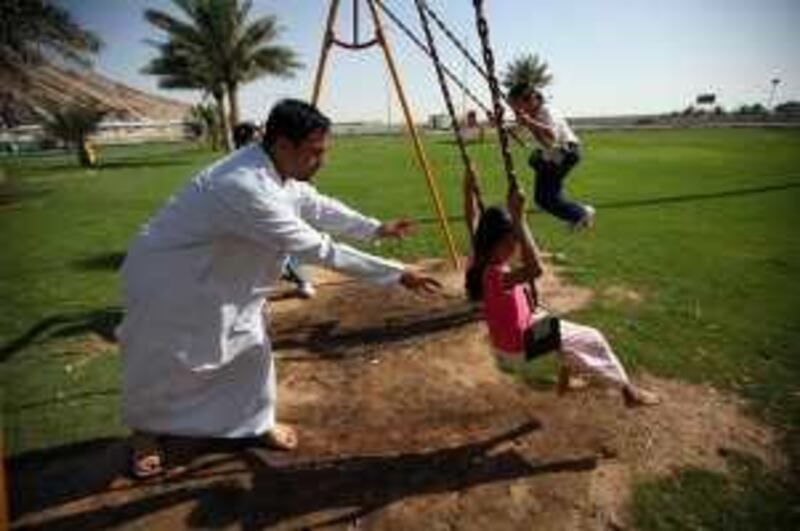The release of the Plan Al Ain 2030 yesterday marks a crossroads in the future of the oasis city. Residents have welcomed changes but hope the city retains its special character.
Al Ain deserves more recognition than it gets, said Ashraf Shad, 57, a research affairs editor at UAE University who has lived in the city for the past five years. "Al Ain is a very literate and learned city, indeed a hub of education," said Mr Shad, an Australian of Pakistani descent who initially planned to stay for only a year but came to love the city. "It is an academic city with numerous learning institutions and excels in numerous areas, especially in health services. "It's the most understated city in the UAE. "It is imperative that the friendly character and atmosphere of Al Ain be preserved. Any development that occurs over the next 20 years has first and foremost to embrace that this city is a historic one, a city of gardens and palaces and as such it should remain."
"When we entered Al Ain we could smell flowers and found the air to be fresh. Al Ain doesn't suffer the same pollution as Dubai does," said Chris Plett, 38, an aircraft engineer from Vancouver, Canada, who works for Emirates Airline. Mr Plett and his colleague, Stuart Thompson, 37, from Johannesburg, South Africa, rode from Dubai to Al Ain on motorcycles. "Al Ain seems to have maintained its culture and has not been commercialised to accommodate the needs of the West as much as other cities in the UAE have done," Mr Plett said. "In Dubai and in Abu Dhabi there is too much construction going on and it's become too commercial," Mr Thompson added. "I don't want to see that happen to Al Ain. "The fact that there is no traffic congestion is a testament to how well designed the city was. Any future development or expansion must maintain or improve the current standards."
"Al Ain is a calm, quiet city, unlike any other city I have seen in the UAE. I would hate to see it developed to become a crowded city that attracts an influx of people from all over the UAE. I love it just the way it is," said Hani Jad, 26, an Egyptian engineer with an electrical company who has lived in the city for six years.
"Al Ain has maintained its Arab and Islamic heritage and culture. You don't see women here scantily clad. It's the ideal place for families," Mr Jad said during a visit to the Green Mubazzarah park at the base of Jebel Hafeet with his wife. "In Al Ain you find the true Emirati culture and heritage. This is where you find the true original Emiratis, Any development here should embrace the city's history."
Mohammed al Shamsi, 33, an officer with the special tactics and operations division of the Al Ain Police, was born and raised in Al Ain and considers it be simply "a large village". "Al Ain is a respite from the hustle and bustle of business-minded Dubai and Abu Dhabi, a wonderful city to raise your children in and to teach them about Islam and the Emirati heritage," he said during a visit to Green Mubazzarah with his wife and five children.
"Al Ain is a tribal city where members of the same tribe are in touch with one another and form alliances and friendships with other tribes. We all know one another here. "Members of the al Shamsi tribe who have spread out all over the UAE come here to gather on special occasions. We are all one another's cousins and Al Ain is our home." Mr al Shamsi said he would like to see the city's heritage preserved and the forts and other historical places restored. "We have to develop educational programmes to teach visitors about the history of the city and the UAE."
"I like Al Ain just as it is. It's not crowded, parking is easy, rents are cheap and the climate is better," said Rasheed Kp, 42, an Indian grocer in the Hilli district of Al Ain, who has lived in the city for 17 years. "If Al Ain is further developed, more and more people will come here and that is when the problems of Dubai and Abu Dhabi will begin here." "Here you will find the original Emiratis with family history predating the birth of the UAE. Life here is more simple, there is more of a sense of community here."
"In 20 years when Dubai and Abu Dhabi are further developed, Al Ain should be the city that people come to, to remember how things were back in the years prior to the unification of the Emirates," said Nasredine Abbas, 40, from Egypt, who has worked in Al Ain for the past 18 months.
Sherrie Wheeler, 64, from the UK, has lived in the city for the past four years. "It would be sad to see Al Ain become like Dubai, but we do need more restaurants and maybe a grassy golf club," said Ms Wheeler, whose husband works for Al Ain Distribution Company. "There is a lot of culture in Al Ain but we need limited commercial developments." However, any development "must concentrate on not repeating the mistakes of Dubai when it comes to the infrastructure and road networks", she said.
Mrs Wheeler's other suggestion for improvement was to have the schools in Al Ain spread out over a wider area. "Right now, many of the schools in Al Ain are in the same area, which becomes congested." ealghalib@thenational.ae






